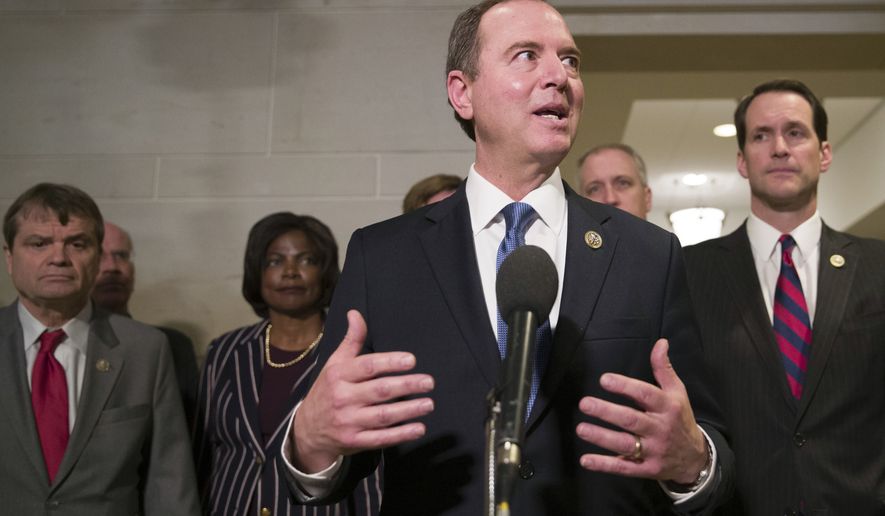President Trump’s onetime fixer Michael Cohen wrapped up a whirlwind week of congressional testimony Thursday but will return next week as questions from lawmakers continue to mount.
As he concluded his appearance before the House Intelligence Committee - one of three congressional hearings he had this week - Cohen told reporters he has another closed-door session with the same panel set for March 6.
Cohen declined to say what was discussed in the meeting or why a repeat performance was necessary.
Committee Chairman Rep. Adam Schiff, California Democrat, called Thursday’s interview with Cohen, “very productive,” saying it “shed light” on the Russia probe, but offered up scant details.
“I can say on a number of topics he testified about yesterday we were able to go into great detail, but we’ve also covered a number of items and issues that were important to us that were not part of the hearing yesterday,” he said.
“He was fully cooperative and answered all of our questions,” Mr. Schiff said of Cohen.
Mr. Schiff also announced the House Intelligence Committee will listen to testimony from Felix Sater, a business executive who worked with Cohen to build a Trump Tower in Moscow.
Mr. Sater is scheduled to appear on March 14, which will also likely to be a sealed hearing. In Cohen’s August 2017 written testimony to the House and Senate Intelligence Committee, he reportedly told lawmakers Mr. Sater’s Moscow-based development company was the go-between for the Trump Tower project.
That project has drawn scrutiny from Democrats, who see it as evidence of Mr. Trump’s connections to Russia. It has also dogged Cohen, who told Congress that the project was abandoned in early 2016 when, in reality, it was still alive in mid-summer of that year.
Cohen was sentenced to three years in prison for lying to Congress about the deal and other crimes. He reports to a federal prison in May.
As he departed Thursday, Cohen insisted he told all three Congressional panels the truth. even as two of the president’s biggest allies referred him to the Justice Department for possible criminal prosecution for allegedly lying to Congress.
GOP Reps. Jim Jordan, Ohio, and Mark Meadows, North Carolina, authored a letter to Attorney General William P. Barr accusing Cohen of multiple false statements and urging criminal prosecution.
The lawmakers detailed several areas of testimony they said was false. Among the most notable was Cohen’s claim that he never sought a White House job, did not committed bank fraud and had no contracts with foreign entities.
“In sum, Mr. Cohen’s testimony….was a spectacular and brazen attempt to knowing and willfully testify falsely and fictitiously to numerous material facts,” they wrote. “His testimony included intentionally false statements designed to make himself look better before a national stage,” Mr. Jordan and Mr. Meadows wrote.
Cohen’s attorney, Lanny Davis, in a statement insisted his client told the truth. He called the referral “baseless” and a “sad misuse” of the criminal justice system.
“He took full responsibility for his guilty pleas. He also backed up much of his testimony with documents,” he said.
A Justice Department spokeswoman confirmed to The Washington Times they received the referral and are reviewing it.
Cohen’s assertion he did not seek an administration position contradicts court filings by the U.S. Attorney for the Southern District of New York, which brought the charges that resulted in a guilty plea.
Cohen “privately told friends and colleagues, including in seized text messages, that he expected to be given a prominent role and title in the new administration,” prosecutors said.
On Wednesday, Cohen insisted that he didn’t want to come to Washington, preferring to stay in New York and spend time with his children. In fact, he claimed he turned down offers to be part of the White House legal team.
“I was offered jobs,” he said, adding Mr. Trump was angry at then-chief of staff Reince Priebus because Cohen had not taken a job in the White House general counsel’s office.
Mr. Jordan and Mr. Meadows also claim that Cohen’s statement that he “never defrauded any bank” was “intentionally false.” They noted that New York prosecutors referred to Mr. Cohen’s crimes of making false statements to financial institutions as “bank fraud” in his plea agreement
Cohen did plead guilty to making false statements to a financial institution, but not specifically bank fraud.
Thursday’s revelations followed a bombshell public hearing Wednesday. While Cohen failed to deliver Democrats the connection between Mr. Trump and Russia they sought. He did tell lawmakers his ex-boss’ praise of Russian President Vladimir Putin made him suspicious.
But Cohen had plenty of fodder for the anti-Trump crowd. He came out swinging against his former boss, calling him a conman, racist and cheat. Cohen accused the president of crimes ranging from financial fraud to campaign violations.
Mr. Trump has denied the allegations, portraying Cohen as a liar making up stories to secure a better deal from prosecutors for his own crimes. Last year, Cohen was sentenced to three years in federal prison for lying to Congress in 2017, campaign finance violations and other crimes.
• Jeff Mordock can be reached at jmordock@washingtontimes.com.




Please read our comment policy before commenting.